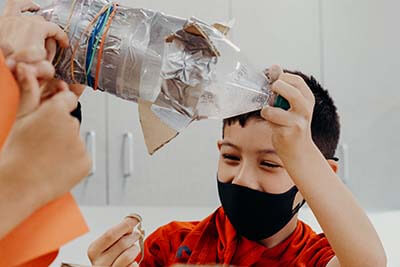September 16, 2021
from Dr. Bill Hudson, Head of School
I have to admit I am a big fan of dystopia books, film, and television. Favorite books include “The Stand” by Stephen King and “Swan Song” by Robert McCammon, movies such as “The Day After Tomorrow” and “I Am Legend”, and television shows like “The Leftovers” and “The Walking Dead.” It’s not that I like gloom and doom or enjoy blood and gore. Rather, I see dystopian literature, films, and television as windows into the human condition, what humans are capable of in the face of horrific conditions, great suffering, or terrible injustice, and the triumph of the human spirit.
Living through the last several weeks, let alone the last 18 months, has been all too much like a dystopian novel. Wildfires in the west, hurricanes in the south, the drought here in Minnesota combined with the lingering effects of the pandemic, all present a series of challenges that are testing the fabric of our society. Like characters in a dystopian movie, we are learning a great deal about ourselves, what we value, and what we are willing to do to endure.
Imagine my surprise last week when dystopia seemed to invade my professional life when I came across the article “Schooling in the ‘Fifth Season’” by Justin Reich in the latest edition of one of my favorite education journals, Educational Leadership. What caught my attention was a quote from a study conducted by the United States Change Research Program, “Humans are re-engineering the geo-chemistry of the planet to be inhospitable to our current civilization. As average temperatures rise and extreme weather events become more common, there will be more fires, more floods, more freezes, more novel disease events, and accompanying migration, civil unrest, and conflict.” (Reidmiller, et al., 2018) While I’m not sure I agree with this assessment, I believe that conducting school no just like we did 18 months ago would be a mistake. Educational systems must be inherently structured to pivot and change and to become more agile and proactively responsive.
What kind of changes need to be made to the institution of schooling so it can continue to offer a safe haven to young people in uncertain times? Reich proposed four approaches:
- Universal technology access
- Pedagogies that are robust to interruption
- Deeper curriculum
- Stronger social welfare
While these suggestions are directed more towards large, public school districts, I did find them helpful in reflecting upon reflecting upon whether MPA is prepared for a “Fifth Season.”
Universal Technology Access
Each student has 1:1 access to either an iPad or iMac. Furthermore, MPA made a significant investment in classroom technology and professional development to enable students and teachers to pivot to virtual learning, if necessary. I lightheartedly made a comment last year among several teachers that the days of a snow day are long gone.* The reality is that we have demonstrated that we can successfully advance learning when faced with a natural disruption like a snowstorm, a forced quarantine, or a water main break.
Robust Pedagogies and Deep Curriculum
Our new strategic plan calls for us to, “Create custom and personalized pathways of learning for students oriented towards achieving mastery through curricular innovation and by leveraging advances in educational technology.” In addition to maximizing the use and integration of technology, MPA has been on a multiyear journey to build upon our school’s strengths in hands-on, experiential, project-based learning. Even prior to the pandemic, we began exploring a move toward competency-based or mastery learning. We will always wrestle with depth versus breadth or content versus process—both are important during periods of greater interruption and disruption.
Strong Social Welfare
Reich’s final suggestion, stronger social welfare, is one I whole heartedly agree with. I witnessed firsthand how students of all ages developed crucial skills such as resiliency and perseverance. It is also clear that the social and emotional health of children has been negatively impacted by the pandemic. For schools like MPA that were able to successfully provide in-person education, the impact is less. However, schools must partner with parents and our large community to attend to the mental health of our young people. Over the last several years we’ve increased counseling and psychological services and will continue prioritize integrated whole-child support services.
Disruption and interruption need not be feared. While living in a VUCA (volatility, uncertainty, complexity, and ambiguity) world may seem dystopian at the moment, I’m pretty sure we are still a long way off from “A Clockwork Orange” or “Gattica”. But that doesn’t absolve us from the responsibility of thoughtful planning and bold innovation. Instead, we must push ourselves to be bound less by convention and embrace new pathways of teaching and learning.
*My comment made in jest, caused quite a stir, and for some, panic. So much so that I needed to reassure teachers and students alike that the first day of a significant snow would indeed be a day off to enjoy with wonder and playfulness. Only on the second or third day would we pivot to virtual learning.